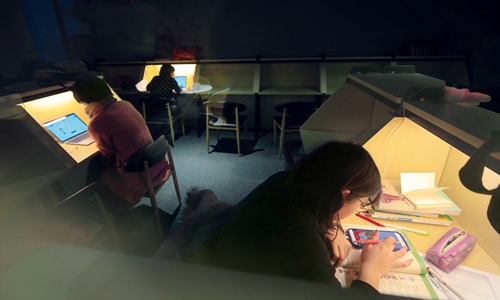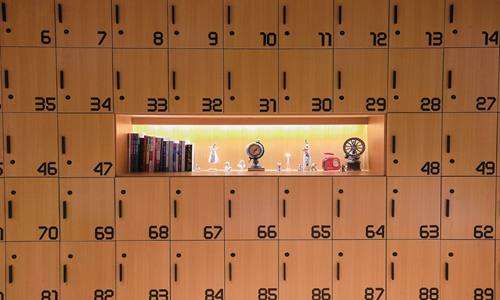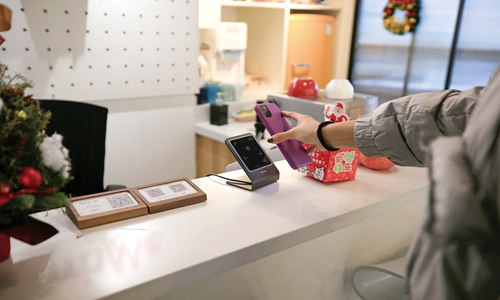HOME >> CHINA
More young people are trying paid study centers for self-improvement
By Chen Shasha Source:Global Times Published: 2020/1/15 18:48:41
A room with a clue
"You have a bright future ahead of you," reads a post-it note on a wall of Zhongxue Space, a privately run study room aiming to create an immersive study environment with its quiet and exclusive space.
Covering around 200 square meters, Zhongxue is located in an old office building on Huashan Road of Shanghai's Xuhui district. It provides three different study spaces to meet the demands of patrons such as a room with a wide window and a room that allows for sounds associated with typing like keyboard tapping and clicking.
The walls are soundproof to ensure patrons in different sections won't be disturbed by each other or bothered by the outside world. After registering as a member and topping up a certain amount of money, people can sit in an individual compartment with a table lamp for them to study.

Built in 1996, the building looks a little bit shabby compared to the new shopping center with glowing lights and advertisements for luxury shops across street, but Zhongxue still boasts a wide view from the 19th floor.
"When people get tired, they can leave their seats and look far into the distance to relax," Liu Kangcan, owner of Zhongxue Space, told the Global Times.
Most of Liu's customers are office workers studying for examinations to obtain certificates needed for career promotions.
About 80 percent of them are between 18 and 35 years old. At the beginning, 90 percent of his customers were examination-oriented, but that proportion has gradually lowered to 70 percent as more patrons use the space as an ideal place for casual reading or working overtime.
This is what Liu expected. "I hope that paid study rooms can become a lifestyle mode in the future. People's relaxing activities during weekends won't be limited to shopping, dining and singing. They are willing to come and do some reading," Liu said.
Rapid growth
Paid study rooms like Zhongxue are showing up like mushrooms after rain in many Chinese cities since 2019. Beijing, Shanghai and Xi'an, Northwest China's Shaanxi Province all have them.
According to a December report by iiMedia Research, paid study rooms now mainly appear in first- and second-tier cities. The report shows that the number of paid study room patrons reached 850,000 in 2018 and 2.3 million in 2019. The number is expected to exceed 7.8 million in 2020.
Starting his first Zhongxue Space in August 2018, Liu now owns four branches of different sizes ranging from 200 to 400 square meters across the city and his business has started making profits. His ambitious plan for 2020 is to open 50 new study rooms in different cities.
Liu believes that there are an increasing number of young people who want to improve themselves and learn new things, which produces a strong demand for paid study rooms. "Around 80 study rooms showed up in Shanghai in 2019," he said.
Wang Zhenyu, 25, co-owner of paid study room StudyWithMe thinks that the public resources deficiency of institutions like libraries creates opportunities for privately run study rooms.
"The cafés are too noisy and public libraries could be far away from home. Ideal places for study are in great shortage," he said.
Wang started up his business with three of his friends in September 2019. Although it is new and small, StudyWithMe has won over patrons from the finance, law and investment fields thanks to its exquisite decoration and proximity to Lujiazui in Pudong New Area, Shanghai.
Wang waits at the reception desk to serve his customers from 8:30 am to 10:30 pm. His business hasn't earned any money yet, but he holds an optimistic attitude for its future, believing that continuous learning is a social trend.

Liu Dingding, a Beijing-based internet industry analyst, told the Global Times that the continuous growth of the knowledge economy contributed to the growth of paid study rooms.
However, Liu thinks that, paid study rooms are a niche market better kept small and refined.
"The imagination space for this field would be very limited," he said.
However, Liu believes that the paid study rooms can help consume the empty spaces in office buildings left behind by failed start-ups.
Split attitudes
People's attitude toward paid study rooms is still divided. According to a research by the iiMedia Research in November, 28 percent of netizens said they can accept paid study rooms and would like to pay for them, 31 percent can accept but will not pay for them, while 41 percent would neither accept nor pay for them.
Gao Ling, 24, is working on a graduate thesis for a master's degree at StudyWithMe. "It is close to metro station, very convenient for me," Gao told the Global Times.
"The school library always gets occupied before the exams or at the end of the semester," Gao noted, adding that the internet access in city libraries is poor.
Alex Yuan, 30, is preparing for GMAT test to achieve future career development. Yuan feels that the environment in the room and its focused patrons create a good and immersive atmosphere, which makes studying more efficient.

"The most important is nothing can disturb you," Yuan said.
However, Chen Xi, a 27-year-old translator who is also pursuing a master's degree holds a different attitude toward the new business.
"I won't pay to study in that space," she said. "It is not cheap. I prefer to stay at home, shutting everything outside the door of my room."
Covering around 200 square meters, Zhongxue is located in an old office building on Huashan Road of Shanghai's Xuhui district. It provides three different study spaces to meet the demands of patrons such as a room with a wide window and a room that allows for sounds associated with typing like keyboard tapping and clicking.
The walls are soundproof to ensure patrons in different sections won't be disturbed by each other or bothered by the outside world. After registering as a member and topping up a certain amount of money, people can sit in an individual compartment with a table lamp for them to study.

People study at Zhongxue Space. Photo: Yanghui/GT
Built in 1996, the building looks a little bit shabby compared to the new shopping center with glowing lights and advertisements for luxury shops across street, but Zhongxue still boasts a wide view from the 19th floor.
"When people get tired, they can leave their seats and look far into the distance to relax," Liu Kangcan, owner of Zhongxue Space, told the Global Times.
Most of Liu's customers are office workers studying for examinations to obtain certificates needed for career promotions.
About 80 percent of them are between 18 and 35 years old. At the beginning, 90 percent of his customers were examination-oriented, but that proportion has gradually lowered to 70 percent as more patrons use the space as an ideal place for casual reading or working overtime.
This is what Liu expected. "I hope that paid study rooms can become a lifestyle mode in the future. People's relaxing activities during weekends won't be limited to shopping, dining and singing. They are willing to come and do some reading," Liu said.
Rapid growth
Paid study rooms like Zhongxue are showing up like mushrooms after rain in many Chinese cities since 2019. Beijing, Shanghai and Xi'an, Northwest China's Shaanxi Province all have them.
According to a December report by iiMedia Research, paid study rooms now mainly appear in first- and second-tier cities. The report shows that the number of paid study room patrons reached 850,000 in 2018 and 2.3 million in 2019. The number is expected to exceed 7.8 million in 2020.
Starting his first Zhongxue Space in August 2018, Liu now owns four branches of different sizes ranging from 200 to 400 square meters across the city and his business has started making profits. His ambitious plan for 2020 is to open 50 new study rooms in different cities.
Liu believes that there are an increasing number of young people who want to improve themselves and learn new things, which produces a strong demand for paid study rooms. "Around 80 study rooms showed up in Shanghai in 2019," he said.
Wang Zhenyu, 25, co-owner of paid study room StudyWithMe thinks that the public resources deficiency of institutions like libraries creates opportunities for privately run study rooms.
"The cafés are too noisy and public libraries could be far away from home. Ideal places for study are in great shortage," he said.
Wang started up his business with three of his friends in September 2019. Although it is new and small, StudyWithMe has won over patrons from the finance, law and investment fields thanks to its exquisite decoration and proximity to Lujiazui in Pudong New Area, Shanghai.
Wang waits at the reception desk to serve his customers from 8:30 am to 10:30 pm. His business hasn't earned any money yet, but he holds an optimistic attitude for its future, believing that continuous learning is a social trend.

There are lockers inside the space allowing people to store their belongings. Photo: Yanghui/GT
Liu Dingding, a Beijing-based internet industry analyst, told the Global Times that the continuous growth of the knowledge economy contributed to the growth of paid study rooms.
However, Liu thinks that, paid study rooms are a niche market better kept small and refined.
"The imagination space for this field would be very limited," he said.
However, Liu believes that the paid study rooms can help consume the empty spaces in office buildings left behind by failed start-ups.
Split attitudes
People's attitude toward paid study rooms is still divided. According to a research by the iiMedia Research in November, 28 percent of netizens said they can accept paid study rooms and would like to pay for them, 31 percent can accept but will not pay for them, while 41 percent would neither accept nor pay for them.
Gao Ling, 24, is working on a graduate thesis for a master's degree at StudyWithMe. "It is close to metro station, very convenient for me," Gao told the Global Times.
"The school library always gets occupied before the exams or at the end of the semester," Gao noted, adding that the internet access in city libraries is poor.
Alex Yuan, 30, is preparing for GMAT test to achieve future career development. Yuan feels that the environment in the room and its focused patrons create a good and immersive atmosphere, which makes studying more efficient.

A woman swipes her phone at the entrance of StudyWithMe. Photo: Yanghui/GT
"The most important is nothing can disturb you," Yuan said.
However, Chen Xi, a 27-year-old translator who is also pursuing a master's degree holds a different attitude toward the new business.
"I won't pay to study in that space," she said. "It is not cheap. I prefer to stay at home, shutting everything outside the door of my room."
Posted in: SOCIETY